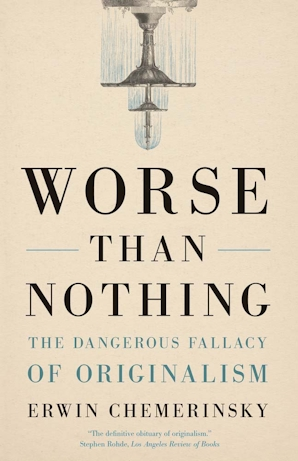When the Court in Dobbs v. Jackson Women’s Health Organization declared Roe “egregiously wrong,” its reasoning rested squarely on originalism. The Court in Roe had held that outlawing abortion infringed the Fourteenth Amendment’s prohibition on “depriv[ing] any person of…liberty…without due process of law.” That couldn’t be right, five justices in Dobbs concluded, because abortion was a crime in most states when the Fourteenth Amendment was adopted in 1868, and there was no evidence that those who drafted or ratified it understood it to invalidate those laws. Since the amendment did not have that meaning then, it cannot have that meaning now.
There is a certain appeal to originalism. At a time when the world seems increasingly complicated, originalism, like other forms of fundamentalism, promises simple answers. At a time when distrust of institutions, including courts, is high, originalism purports to tie judges’ hands. And in a divided nation that no longer seems to have shared values, originalism directs courts to enforce the understandings of a presumably more cohesive past. Originalism accords with how judges interpret contracts, enforcing their terms as they were understood at the time they were agreed to. And any other approach, originalists insist, leaves judges free to impose their own personal views on the rest of us—“legislating from the bench.”
But the simplicity and objectivity that originalism promises are a charade. In Worse Than Nothing, Erwin Chemerinsky, the dean of the University of California, Berkeley, School of Law and one of the nation’s leading constitutional scholars, offers a concise, point-by-point refutation of the theory. He argues that it cannot deliver what it promises—and if it could, no one would want what it is selling. Many eminent scholars and jurists have previously exposed originalism’s flaws, including Ronald Dworkin, Stephen Breyer, John Hart Ely, and Bruce Ackerman, but few have done so as clearly, succinctly, and persuasively as Chemerinsky.
The problems begin with originalism’s principal claim, namely that it constrains judges more meaningfully than other modes of interpretation. Chemerinsky convincingly shows that for multiple reasons, originalism leaves as much room for judgment as other theories of constitutional interpretation.
Originalists must first decide which historical evidence counts, and as every historian knows, that requires a great deal of judgment. Early versions of originalism referred to the “original intent” of the framers, but little evidence of their intent exists. The records of the Constitutional Convention are sparse; we are left largely to rely on James Madison’s notes, but their objectivity has been questioned. As Justice Robert Jackson quipped:
Just what our forefathers did envision, or would have envisioned had they foreseen modern conditions, must be divined from materials almost as enigmatic as the dreams Joseph was called upon to interpret for Pharaoh.

